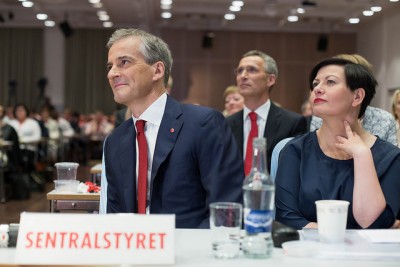Labour Party leader Jonas Gahr Støre ended the week with a solid majority of voter support, despite facing some of the harshest criticism he’s met since taking over as Labour’s boss in June. According to a new public opinion poll released this week, more than half of Norway’s voters want Støre to be prime minister.

The poll, conducted by research firm Norstat for Norwegian Broadcasting (NRK), showed that 50.9 percent of voters polled answered “Jonas Gahr Støre” when asked who they believed was best-suited to be Norway’s prime minister. Only 32.4 named the current prime minister, Erna Solberg of the Conservative Party.
“I view this as a source of inspiration,” Støre told NRK, careful like most other politicians to not boast too highly of poll results. The acid test comes at the ballot box, with the next national election not scheduled until the fall of 2017.
The poll indicated, however, a widening gap between Solberg and Støre, who now leads the opposition in Parliament. Labour still emerged as the largest single political party in the last national elections in the fall of 2013, but it failed to form a majority coalition because of the poor showing of its former government partners. That opened the way for Solberg to form her conservative minority government coalition, but it still must rely on its two so-called “support parties” in parliament, the Christian Democrats and the Liberals.
Solberg could nonetheless watch Støre squirm
Støre’s strong showing in recent months poses a constant challenge to Solberg and her government partners. His first claim to a majority, however, ironically came after a week in which he had to face his first major round of personal criticism. It involved his position on freedom of expression, which has been a hot topic of public discussion in Norway since the attacks by Islamic extremists on a satire magazine in Paris last week. Støre has had to defend his commitment to freedom of expression, and clarify his position on the rights of media to publish material that can be viewed as blasphemous.
While Solberg and many other politicians were claiming that all religions must tolerate satire and insults, Støre’s handling of a caricature dispute in Norway when he was foreign minister came back to haunt him. A small Christian magazine in Norway had, in 2006, chosen to publish a highly controversial Danish cartoon of the Prophet Mohammed that set off angry demonstrations, especially in the Middle East. Protesters stormed both the Danish and Norwegian embassies in Syria and the Norwegian editor of the Norwegian magazine received death threats.
Disputed apology
Instead of staunchly defending the magazine’s right to freedom of expression by publishing the cartoon, the Norwegian foreign ministry that Støre ran at the time sent out what amounted to instructions to its ambassadors around the world in which they were told to express “great understanding” that the cartoon was “offensive to Muslims around the world.” Norwegian ambassadors were advised to say they were “sorry the publication had disturbed Muslim communities,” while a sentence about the right to freedom of expression was relegated to the bottom of the statement.
Vebjørn Selbekk, editor of the magazine that came under fire, has said he felt he was made into a scapegoat by Støre and the Labour-led Norwegian government. When Støre seemed this week to defend the position he took in 2006, telling DN that it “hindered violence on Norwegian soil,” he became the target of harsh criticism from politicians and commentators.
‘Frightening’
“I would have formulated the statement differently today,” Store told DN, stressing, though, that it did “make it clear that freedom of expression applies in Norway.” He went on to add that he didn’t think it was important “to stand up for the right to carry out blasphemy,” a statement that the Liberals Party leader Trine Skei Grande claimed was “frightening” because “then the terrorists can lean back and say (their attacks) worked.”
Støre had to spend much of the rest of the week defending himself and his position in several radio and TV debates and it all finally died down with Støre professing his commitment to freedom of expression and conceding that it also provides a right to publish insults.
He could console himself with the public opinion poll results, although voters were polled before the criticism erupted over his outlook on the publication of insults. Støre also won support from newspaper Dagsavisen, which pointed out that Støre is the first Labour leader “to openly display his Christian faith.” Even though several former top Labour officials have been atheists, Dagsavisen commentator Arne Strand wrote that they didn’t like blasphemy either and Støre is thus following a long party tradition.
newsinenglish.no/Nina Berglund

